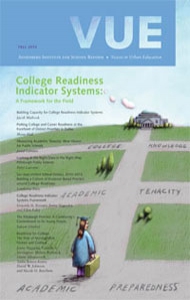As schools and districts face new, higher national expectations for college readiness, they must develop better ways of identifying students who are struggling and connect them to supports.
College Readiness Indicator Systems: A Framework for the Field

AISR’s research, practitioner, and community partners reflect on lessons learned from three years of work on the College Readiness Indicator Systems project to identify students who are off track for college readiness and connect them to supports.
With college readiness at the center of district priorities, Dallas has made strides in measuring and understanding the role that schools play in students’ knowledge of how to navigate the college experience.
A district-like school support network in New York City is expanding its academic preparedness indicator and support system to include indicators for academic tenacity.
Pittsburgh is using its college readiness indicator system to focus on the most useful information to monitor and the most effective way to analyze it to help students stay on track.
San Jose has integrated a college readiness indicator system into its strategic plan with the goal of ensuring that all its graduates leave the district prepared to fully participate in a global society.
A new framework from the CRIS initiative provides guidance for schools and districts to implement a system of indicators and supports for students who are off track for post-secondary success.
A community organization has mobilized resources to make a promise to every public school student in Pittsburgh: if you do well in school, we’ll help with the financial burden of attending college.
Research has shown that in addition to academic knowledge, a variety of noncognitive skills are essential to students’ post-secondary success.






